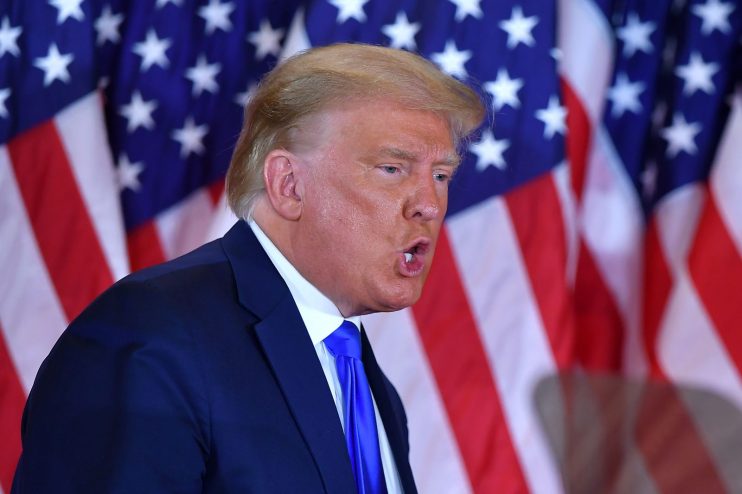‘Markets got what they really did not want’: The City reacts to knife-edge US election

Investors didn’t want this to happen. They had bet on a Joe Biden win in the US presidential election that they hoped would unleash a big stimulus, but found themselves rapidly adjusting their positions as the race became too close to call.
Bonds and the dollar rose as investors sought safety. US stocks were volatile, with futures nosediving when president Donald Trump falsely claimed victory, before recovering somewhat.
In the City of London and the rest of Europe, traders were firmly in “wait and see” mode. The FTSE 100 was tracking slightly higher, with the rush to the dollar pushing down the pound.
Here’s what City figures made of the events so far.
‘Chaos is the last thing people want’
Russ Mould, investment director at AJ Bell said that while Trump’s false declaration of victory may not be surprising, it was still enough to cause turbulence on the markets.
“While perhaps characteristic of Trump’s typical behaviour, it wasn’t what the markets were expecting and so we’re experiencing wild swings in asset pricing,” he said.
“Chaos is the last thing people want, particularly when coronavirus is causing so much disruption to the world. We’re now facing the prospect of volatile markets for days or potentially weeks until the election is sorted out.”
Trump’s comments “raise the chances of the election result being fought out in the Supreme Court,” Mould continued, “thus prolonging the outcome, and causing more uncertainty which markets hate”.
Jim Leaviss, chief investment officer of public fixed income at M&G, agreed. “Markets got what they really didn’t want with a lot of uncertainty this morning,” he said.
“For bond markets, no blue wave means no hugely redistributive fiscal policy, no infrastructure boom, even if Biden gets elected,” he continued. “There will likely be no reversal of the corporate tax cut that most people were expecting, which will be positive for equities as earnings-per-share will be higher than it would have been otherwise.”
“With fiscal stimulus more difficult to execute it also means that in the event that the US economy slows again – and a winter Covid wave is likely – then it will be down to monetary policy to provide support once more,” Leaviss said.
Uncertainty over future stimulus measures
Fiona Cincotta, market analyst at City Index, said that “caution dominates” in Europe. “The elections are going down to the wire and that is unnerving investors.”
Cincotta said Congress was the other major consideration where fiscal stimulus is concerned.
“Congress is also going down to the wire with the Democrats not flipping as many seats as the polls had indicated in the Senate.
“This is key, because even if Joe Biden wins, but fails to flip the Senate, then more fiscal stimulus deadlock could be expected which is unfavourable for both risk sentiment and stocks.”
“While we knew we would have to wait for final results – as is always the case – any hopes that results would be clean enough to allow independent news stations to declare winners has evaporated,” said David Page, Head of Macro Research at AXA Investment Management.
Whoever eventually triumphs in the election is likely to face a divided Congress, Page continued.
“That is likely to stall the implementation of much of Biden’s progressive manifesto but would also likely stop President Trump enacting a material second tax cut programme. The former would likely have proven more simulative to the US economy as it continues to recover from the pandemic shock. It is also likely to weigh on any short-term stimulus package that we still expect to be announced early next year, but of reduced size compared with other electoral scenarios.”
Kit Juckes of Societe Generale said markets are waiting for clarity from the election. Yet the foreign exchange expert cautioned that who is in the White House is not the be all and end all for markets in the near term.
“I still believe the Fed matters more for the dollar,” he said. “That said, a President Trump second term would be more combative on trade than a President Biden term would be and that’s a net negative for the most trade-sensitive currencies.” Juckes said that included the Australian dollar and euro.
He added that the Bank of England’s interest rate decision tomorrow is key for the pound. Brexit talks are another major consideration for UK investors, he said. “Every day we don’t get any clear news will bring pressure on GBP.”